- Home
- Jane Arbor
Golden Apple Island Page 4
Golden Apple Island Read online
Page 4
At luncheon, served on the shaded half of the patio, there were present only Raquel and Fran, Lucia and Don Diego, no Gil. Don Diego’s sharp query as to his absence was answered by Lucia’s shrug of ignorance and they sat down without him. The meal, to Fran’s relief, was much lighter and shorter than last night’s dinner had been and the talk was intermittent, even lazy, as if everyone was more than ready for the siesta to follow.
For this quiet hour Raquel chose to go to her room, and after settling her there behind closed shutters, Fran returned to the patio where presently she drowsed herself.
She woke to find Gil sitting beside her, his eyes intent upon her as she sat up and smoothed her fingers over her lids. ‘I’ve been asleep,’ she said.
‘No?’ He smiled his attractive, curved smile. ‘You’ve been snoring like a grampus,’ he accused her.
‘I don’t snore!’
‘Like a grampus,’ he insisted. ‘What, by the way, is a grampus, and is it known ever to do anything but snore? However, let it pass. What were you doing, out along the playa this morning? Where had you been with the earnest Jervis?’
‘He had invited me to go out to the site he is managing for Grandfather.’ Fran had thought of him as her own grandfather for so long that the word came easily. ‘Anyway, what were you doing? I thought you had promised to show me the island yourself?’
‘Oh, recognition was mutual, was it? And you were sore because you thought I had broken our date to keep one with Elena? But if you remember, I said we’d paint the town, and you don’t do that in stark daylight, as you should know. So will you dine with me downtown tonight, which is what I meant?’
‘Thanks. I’d like to, if Mother is well enough to be left. What time?’ said Fran.
‘Oh, eightish away from here. We’ll have a drink on the plaza first.’ Gil stretched and rose, adding casually, ‘You’ve been here nearly twenty-four hours now. Have you yet been assigned your role in the Quinta scheme of things, I wonder?’
‘Assigned my role?’ But she had started at the shrewdness of the question, and Gil nodded.
‘Ah, you have? And as what, one wonders? Are you to be left to concentrate on giving Aunt Raquel the care she needs? Or are you to act as Aunt Lucia’s aide? Or even as a companionable leech to keep me out of mischief off duty?’ And as Fran flinched, ‘My dear,’ he mocked, ‘since we’re all assorted pieces in Grandfather’s personal jigsaw, sooner or later you were bound to be briefed on the shape he means to give you! But I won’t press for details if you’d rather I didn’t.’
‘I’d much rather,’ Fran retorted, ‘that you didn’t work off your cheap cynicism about Grandfather on me! If you don’t like it here, why do you stay?’
‘Why?’ Gil looked affronted that she should ask. ‘Because I’m a de Matteor, of course! Because I belong. Because the de Matteors are El Naranjal and always have been.’
‘Oh, they are? Well, you haven’t always identified with it so closely. What about the time you ran away from it to England?’ she reminded him.
‘That was about when we were beginning to be discovered by the air-tourists. It seemed to me that someone around here should find out what you Europeans were like and to learn at least one of your languages. It was a toss-up whether I ran to, say, Germany or England. I chose England, and when I’d got all I wanted, I came back.’
‘Really?’ drawled Fran. ‘You were that foresighted at—what was it? —seventeen? Now we were under the impression you were playing truant from school!’
Gil grinned. ‘Trust you to tangle the strings of a man’s pet kite! All right, perhaps it is only hindsight that tells me I knew what I was about when I came to England. But when I came back, as soon as I stopped having to eat my meals standing after Grandfather had dealt with me, I never regretted it, and I don’t now. And as for “identifying” with the island, as you call it, I work for it, don’t I? I recruit labour, I ship bananas, I take non-Spanish-speaking V.I.P.s off the old man’s hands and I’m currently your friend Jervis’s dogsbody. Enough to be going on with? Or have you formed an ineradicable private image of me as “Parasite Gil”?’
‘Of course not. I’m sorry.’ As she spoke Fran reflected how often Gil contrived to make his side of an argument appear as such sweet reason that it wasn’t to be denied. Somehow you found yourself apologizing, giving him best; even secretly agreeing that he could be right and waiting to sun yourself in his forgiving smile.
It came now. ‘Then that’s all right. Just so long as you agree I have a right to exist—’ he said. And then, ‘And always supposing you were deputed to stick closer than a brother to me for my own good, tonight’s caper should put us both in high favour, shouldn’t it? Happy Thought for the Day!’
With which he blew her a kiss and took himself off.
On the plaza the cafe-bars were harsh with light, but the floodlit facade of the Cathedral was breathtaking and strung lanterns in the branches of the plane-trees made their shadows into secret and romantic places. Gil chose a different table and a different bar from Rendle Jervis’s choice, but there too were the inevitable newsvendor, the shoeshine boy and the lace-seller.
Gil bandied with the newsvendor, ‘Go away. I’m saving my money. Whatever news there is to-night will keep till to-morrow.’
The man showed white teeth in a broad grin.
‘No, no, senor! This you always say, but you buy! And the news—wars, floods, robberies—it is all fresh tonight and will be stale by morning!’
‘Oh, very well.’ Gil handed over the necessary pesetas and much the same exchange took place between him and the shoe-boy and the old lady.
‘You cleaned my shoes this very morning,’ he accused the boy. ‘They don’t need doing again.’
‘But no, senor! Not me. That was another boy, another Senor! Ah, that is good—’ as Gil offered his foot. And after demanding of the lace-seller what need she supposed he had of fancy mats, he made her spread the contents of her basket for Fran’s inspection and bought the set which she admired most. It was plain, she thought, that everyone was enjoying themselves hugely and from long habit could have forecast the outcome. For this was Gil, radiating charm and generosity, making himself loved, and making Rendle Jervis’s prudence of the morning look colourless and even mean.
For the best part of an hour they sat under the trees, watching the passers-by. Then they went on to a restaurant where Gil was greeted on so many sides that they made something of a royal progress to their table where so many people dropped in on them during the meal that they were scarcely tete-a-tete at all. And afterwards, though Fran, a little heady with wine and rich food and novelty, would willingly have gone home, Gil took her on a leisurely drive round the town, saying that the treat of the evening which he had in store for her would not be laid on until midnight.
The drive took them through silent streets, dark as canyons and in places so narrow that, Gil said, people were able to shake hands across from one upstair reja to another. By contrast there were the wide tree-lined avenidas where the walled mansions of other days were now public offices and luxury apartments, and by contrast again to their dignity there was the feverish brilliance of the expensive shopping streets—every shop, even at that hour, a blaze of light and decor and some of them still open for business.
Fran supposed they were to finish the evening at a night-club, but nothing was less like a night-club entrance than the carved doorway in a high wall at which Gil at last drew up. Other cars were parked on the avenue and beyond the doors was a wide quadrangle, softly lighted and open to the sky and with tables placed under the series of Moorish arches which surrounded it.
At a signal and a word from Gil a waiter led them to a table, Gil ordered wine and Fran asked, ‘Is it a night-club? An open-air one?’
Gil said, ‘Ordinarily it is. It’s our most exclusive spot—the Patio de las Munecas, the Courtyard of the Dolls. But to-night we’re here by invitation. There’ll be some other items first, but Elena is giving some songs
as a kind of aperitif to her recital season. I want you to hear her.’
‘Oh— Yes, Mr. Jervis told me about her—’
‘Mr. Jervis? I’d have thought you would be on “Rendle” terms with him after this morning’s jaunt. What did he tell you about Elena?’
‘About her singing. He says she has made her style unique to herself and that she’s rightly famous all over the Mediterranean.’
‘Would he know? I’d have said his standards were set by his suburban choral group belting out comic opera,’ retorted Gil unfairly. But before Fran could defend Rendle Jervis’s right to his own taste in music a guitar trio appeared in the spotlight and the audience hushed to hear it.
Afterwards there was some Spanish dancing by a couple who made their castanets speak a whole language of romance, then a danced burlesque of a bullfight; after that an interval and then Elena Merced was there in the circle of light, sheathed in silver from throat to ankle, as lone a figure as her voice was alone, unaccompanied by any instrument as she lifted it to the stars.
She sang only three songs and gave no encores, though deafening applause greeted the end of each. They were harsh, full of strange cadences, plaintive and hotly passionate by turn, utterly alien to English ears and for Fran, an experience she would not forget.
Afterwards the guitar group was to play again, but Gil did not wait. He stood up. ‘Shall we go?’ It wasn’t a question, and Fran obediently gathered her bag and gloves.
Outside he looked down at her. ‘Well?’ he asked.
Fran drew a long breath. ‘It was—out of this world. Somehow—weird, fascinating. Those whispers! And then at other times, almost as if she were needing to throw her voice over mountains.’
Gil opened the car door. ‘That’s acute of you,’ he said. ‘Because that's how the Spanish sound we make evolved—our forefathers had to communicate across our peaks and our valleys. And Elena herself? Or isn’t it done to ask any woman her opinion of another?’
‘Of course it’s done.’ Fran added slowly, ‘She is—quite lovely. And gifted. A thousand light-years away from anything I am myself. And so Spanish, so exotic that it just isn’t true.’
Gil took his own seat and started the car. ‘Fair enough,’ he agreed. ‘Though I wouldn’t use so many adjectives myself. For me she is—all Canaria, all my country. But for whose liking, pray, aren’t you Spanish enough yourself? For your own? Or for Grandfather’s? Or whose?’
But there were too many trap answers to that question and Fran was glad he did not press it. At the Quinta he went in with her but left the car-engine ticking over, and a sixth sense told her what that meant.
‘You’re not staying?’ she asked.
He grinned. ‘Bed at this hour is only for little cross-bred Cinderellas,’ he said. ‘Their escorts get more licence! So good-night, prima mia, you’ve still time to dream—’
This time his kiss was the merest cousinly touch on her forehead. Then he left her standing and she heard the car rev up and roar away.
Bleakly she told herself she knew very well where he was going; that he knew she knew and did not care. He had given his ‘little cousin’ her evening, hadn’t he? Now the rest of the night was his to use as he chose.
CHAPTER III
With what Gil had called ‘the Spanish sound’ going on all around her Fran soon found she was speaking it easily and even translating her thoughts into it. However, she and Raquel usually spoke English to each other when they were alone and Raquel still called her Fran, though not in Don Diego’s hearing after the day he caught her up on it, frowning.
‘ “Fran” ? Why do you call Francisca this? It is not her name.’
Raquel coloured. ‘No—That is, it has always been our pet name for her. We used to call her Fran in England.’
‘Whose pet name for her?’
‘Mine—and Tom’s.’
‘Well, I do not like it. It is ugly ... too English. Since you had the good taste to choose an attractive Spanish name for her I hope you will try to call her by it in future—’ Which summary edict made Fran seethe, but in which she co-operated, having promised Raquel she would, and even allowed after a week or two that against the background of the Quinta ‘Francisca’ had some quality which ‘Fran’ had not.
Whether or not her aunt Lucia had taken her orders from Don Diego Fran did not know, but certainly Lucia saw to it that her spare time was filled—with gathering and doing flowers for the house, helping with the issue to the maids of clean laundry from the cedar-scented presses in the linen room, learning the make-up of Spanish dishes which were strange to her and accompanying Lucia to her marketing, almost all of which was done personally, rarely by telephone.
It was on one of these errands that, hearing Fran had been taking driving lessons in England, Lucia said, ‘You should continue them here. You could have the use of my car when I don’t want it and Gil must teach you.’
Fran shook her head. ‘That’s very kind of you, Aunt Lucia, and I’d be grateful for the car, but I’d rather not.’
‘No?’ Lucia looked her surprise. ‘I’d have thought you would like to drive. When you were qualified you could take your mother about and you could also relieve me of some of my shopping.’ Wondering how soon her aunt envisaged she would be equal to driving on the precipitous roads of the island, Fran said, ‘I’d be glad to do both—if I were going to be here long enough. I’d also like to continue my lessons, but not with Gil instructing me, please.’
‘But why not, child? He has time to spare and he is as skilled a driver as any expert.’
‘I daresay,’ Fran agreed. ‘It’s just that I refuse to ask him to teach me. We know each other too well and we should spend most of the lessons in argument.’ She hoped she need not enlarge on an absurd reluctance to crash her gears and stall her engine under Gil’s caustic eye, and to her relief Lucia did not press the point.
She smiled her rather grim smile. ‘So? Well, though I have heard it said that a husband and wife cannot agree over a steering-wheel, the same thing of mere cousins—no. However, if you would rather have a professional instructor, I will ask your grandfather to arrange it.’
But Fran, deciding to jump that gun, arranged for both a car and lessons from a garage in the town and took herself down from the Quinta by bus on the afternoons when she had them. Afterwards she had time to spare before her return bus and this she spent walking on the front or, as the days shortened and the early dusk came down, window-shopping on the Calle Sant’ Antonia, the Bond Street of El Naranjal.
She was thus engaged one afternoon when she was aware of someone behind her shoulder and turning, found Rendle Jervis there.
He offered his hand. ‘Hullo to you,’ he said.
‘What are you doing down here, all by yourself and practically after dark?’
She told him and saw his brows go up. ‘You must have managed to blow away a few cobwebby scruples,’ he commented. ‘But since you are here, what about sharing a dish of tea with me? At my flat which is only just around the corner?’
Fran hesitated. ‘Oh, I don’t know—My bus—’ As she looked at her watch he laughed.
‘Your bus—or some scruples of your own? My dear girl, you can forget both. I’ll drive you back myself and I live with a flat-mate, a Yorkshireman who wouldn’t forgo his five-o’clock cuppa in face of an earthquake and who’ll be brewing it this minute. Safety in numbers, eh? So will you come?’
Fran turned with him and on the way he explained he was walking because his car was having a minor repair at a near-by garage. ‘When we’ve had tea, if you’ll walk there with me, I’ll return you to the Quinta in no time,’ he promised.
For tea there were toasted scones (‘They haven’t a clue here on crumpets,’ mourned Bill Cole, Jervis’s flat-mate) and Dundee cake (‘Tinned, sent out from England’), and everything about the apartment was as English as both men could make it. Jervis promised to beat the bus, so that Raquel need not worry at Fran’s non-arrival by it, and about when i
t was due to leave they went down to the street together.
‘Careful!’ His hand went to her elbow on the kerb of the narrow pavement as a car approached, momentarily checked its speed and then swept on.
‘And that was your cousin Gil,’ he added. ‘Did you notice?’
Fran hadn’t. ‘If I had, we could have flagged him down and he could have saved you the journey up to the Quinta,’ she said.
‘Always supposing I wanted to be saved the journey,’ said Jervis.
When they arrived she asked him in and he stayed for a glass of sherry with Lucia and Raquel. It was later, when Fran was alone in the salon, that Gil came in and, without a word of greeting, suddenly accused her.
‘Down there ’—he jerked a thumb—‘you were coming out of Rendle Jervis’s apartment!’
‘Down—?’ Fran collected herself. ‘Oh yes, you went by, didn’t you, though I didn’t see you myself.’
‘I know you didn’t. You were too occupied—How often have you been there with the fellow?’
‘How often? Why, never before. After I had had my driving lesson he asked me to tea and then he drove me home instead of my catching the bus.’
‘You met him by arrangement after your lesson?’
‘Of course not. Anyway, what if I had? What’s wrong with that?’
‘With meeting him? Nothing—so long as you didn’t let him take you to his apartment for “tea” ’ Gil’s tone made a sneer of the word, and Fran’s temper exploded.
‘Look,’ she said, ‘Rendle Jervis met me by chance on the Calle Sant’ Antonia. He was waiting for a repair to his car, so he asked me to tea, and his flat-mate, a man named Cole, had it all ready and was there all the time. What’s more, it was five o’clock in the afternoon! So what sort of a compromising hour is that, for goodness’ sake?’
‘As if the time made any difference! The man should know better than to ask a girl of your standing to visit him in his flat at any hour. And you should know better than to—’
Fran laughed. ‘Than to accept? Gil, how utterly archaic can you get? You sound exactly like Grandfather!’

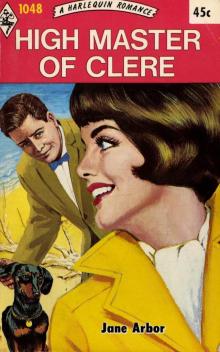 High Master of Clere
High Master of Clere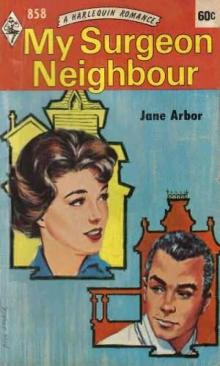 My Surgeon Neighbour
My Surgeon Neighbour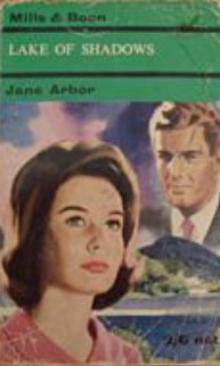 Lake of Shadows
Lake of Shadows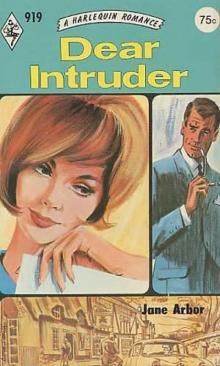 Dear Intruder
Dear Intruder Flash of Emerald
Flash of Emerald Return to Silbersee
Return to Silbersee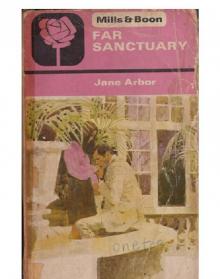 Far Sanctuary
Far Sanctuary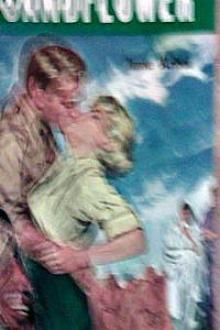 Sandflower
Sandflower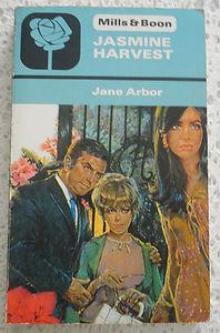 Jasmine Harvest
Jasmine Harvest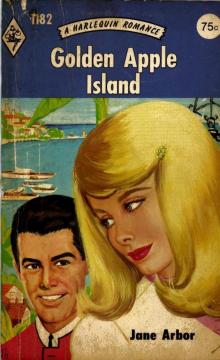 Golden Apple Island
Golden Apple Island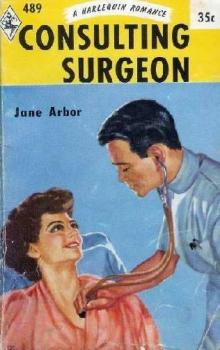 Consulting Surgeon
Consulting Surgeon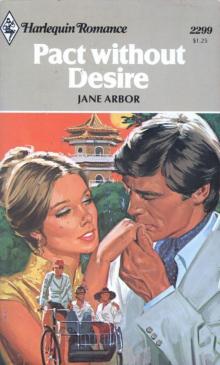 Pact without desire
Pact without desire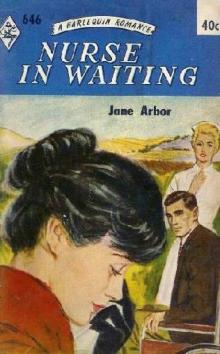 Nurse in Waiting
Nurse in Waiting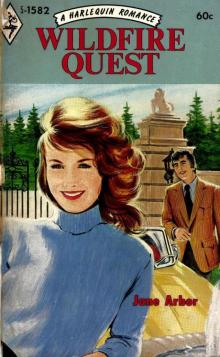 Wildfire Quest
Wildfire Quest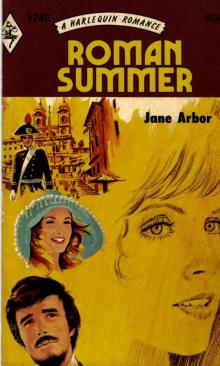 Roman Summer
Roman Summer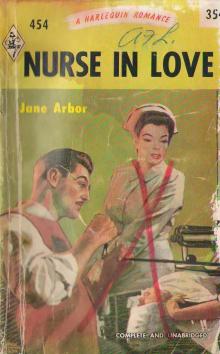 Nurse in Love
Nurse in Love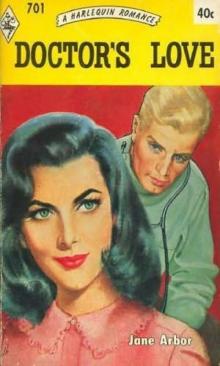 Doctor's Love
Doctor's Love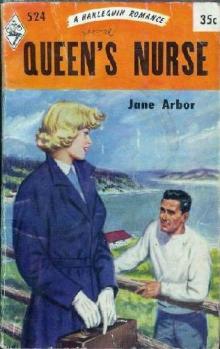 Queen's Nurse
Queen's Nurse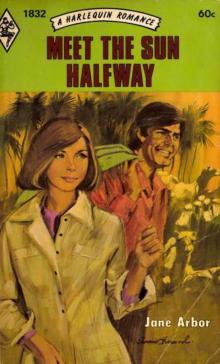 Meet the Sun Halfway
Meet the Sun Halfway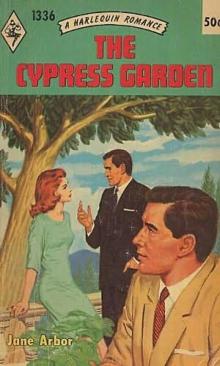 The Cypress Garden
The Cypress Garden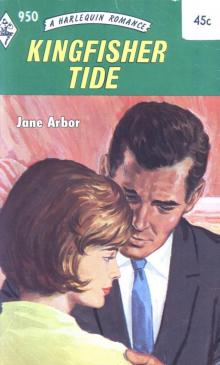 Kingfisher Tide
Kingfisher Tide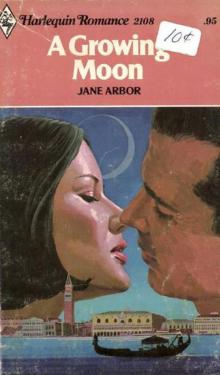 A Growing Moon
A Growing Moon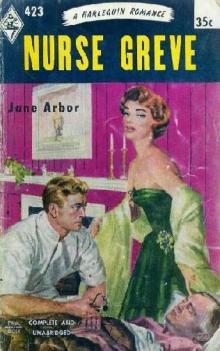 Nurse Greve
Nurse Greve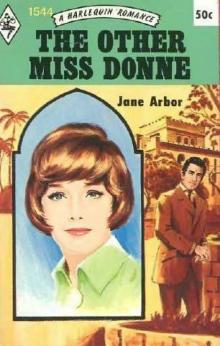 The Other Miss Donne
The Other Miss Donne